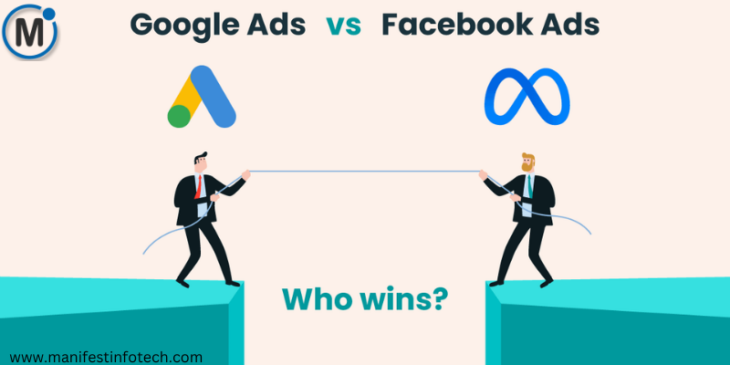
In this blog post, we’ll compare Facebook Ads and Google Ads to determine which platform is better suited for businesses in 2024.
𝟏. 𝐑𝐞𝐚𝐜𝐡 𝐚𝐧𝐝 𝐀𝐮𝐝𝐢𝐞𝐧𝐜𝐞 𝐓𝐚𝐫𝐠𝐞𝐭𝐢𝐧𝐠:
𝐅𝐚𝐜𝐞𝐛𝐨𝐨𝐤 𝐀𝐝𝐬:
– Facebook has over 2.8 billion monthly active users, making it one of the largest social media platforms worldwide.
– Facebook Ads offer extensive audience targeting options based on demographics, interests, behaviors, and even specific user actions.
𝐆𝐨𝐨𝐠𝐥𝐞 𝐀𝐝𝐬:
– Google processes over 3.5 billion searches per day, making it the most popular search engine globally.
– Google Ads allow advertisers to target users based on search intent, keywords, location, device type, and more.
𝟐. 𝐀𝐝 𝐅𝐨𝐫𝐦𝐚𝐭𝐬 𝐚𝐧𝐝 𝐏𝐥𝐚𝐜𝐞𝐦𝐞𝐧𝐭:
𝐅𝐚𝐜𝐞𝐛𝐨𝐨𝐤 𝐀𝐝𝐬:
– Facebook offers a variety of ad formats, including image ads, video ads, carousel ads, and more.
– Ads can appear in users’ News Feeds, Stories, Messenger, and on the Audience Network.
𝐆𝐨𝐨𝐠𝐥𝐞 𝐀𝐝𝐬:
– Google Ads support text ads, display ads, video ads, shopping ads, and app promotion ads.
– Ads can appear on Google Search, YouTube, Google Display Network, and Google Maps.
𝟑. 𝐂𝐨𝐬𝐭 𝐚𝐧𝐝 𝐑𝐎𝐈:
𝐅𝐚𝐜𝐞𝐛𝐨𝐨𝐤 𝐀𝐝𝐬:
– Facebook Ads tend to have lower average cost-per-click (CPC) compared to Google Ads.
– However, the cost of Facebook Ads can vary depending on factors such as audience targeting, ad relevance, and competition.
𝐆𝐨𝐨𝐠𝐥𝐞 𝐀𝐝𝐬:
– Google Ads typically have higher CPC rates, especially for competitive keywords.
– However, Google Ads can deliver higher intent traffic, leading to a potentially higher return on investment (ROI).
𝟒. 𝐀𝐝 𝐏𝐞𝐫𝐟𝐨𝐫𝐦𝐚𝐧𝐜𝐞 𝐚𝐧𝐝 𝐓𝐫𝐚𝐜𝐤𝐢𝐧𝐠:
𝐅𝐚𝐜𝐞𝐛𝐨𝐨𝐤 𝐀𝐝𝐬:
– Facebook provides detailed insights into ad performance, including reach, engagement, conversions, and more.
– Advertisers can track user interactions and conversions across multiple devices and platforms using Facebook Pixel.
𝐆𝐨𝐨𝐠𝐥𝐞 𝐀𝐝𝐬:
– Google Ads offers robust tracking and reporting features, allowing advertisers to measure clicks, impressions, conversions, and other key metrics.
– Google Analytics integration provides additional insights into user behavior and conversion paths.
𝟓. 𝐓𝐚𝐫𝐠𝐞𝐭𝐢𝐧𝐠 𝐂𝐚𝐩𝐚𝐛𝐢𝐥𝐢𝐭𝐢𝐞𝐬:
𝐅𝐚𝐜𝐞𝐛𝐨𝐨𝐤 𝐀𝐝𝐬:
– Facebook’s advanced targeting options allow advertisers to reach highly specific audiences based on interests, behaviors, and demographics.
– Custom Audiences and Lookalike Audiences enable advertisers to target users similar to their existing customer base.
𝐆𝐨𝐨𝐠𝐥𝐞 𝐀𝐝𝐬:
– Google’s keyword-based targeting enables advertisers to reach users actively searching for products or services related to their business.
– Audience targeting options include demographics, interests, and remarketing lists.
If you are looking for any services related to Website Development, App Development, Digital Marketing and SEO, just email us at nchouksey@manifestinfotech.com or Skype id: live:76bad32bff24d30d
𝐅𝐨𝐥𝐥𝐨𝐰 𝐔𝐬:
𝐋𝐢𝐧𝐤𝐞𝐝𝐢𝐧: linkedin.com/company/manifestinfotech
𝐅𝐚𝐜𝐞𝐛𝐨𝐨𝐤: facebook.com/manifestinfotech/
𝐈𝐧𝐬𝐭𝐚𝐠𝐫𝐚𝐦: instagram.com/manifestinfotech/
𝐓𝐰𝐢𝐭𝐭𝐞𝐫: twitter.com/Manifest_info
#FacebookAds #GoogleAds #DigitalAdvertising #AdvertisingPlatforms #MarketingStrategy #DigitalMarketing #PPC #SocialMediaAdvertising #SearchAdvertising #OnlineMarketing #BusinessStrategy #MarketingTrends #AdTech #DigitalStrategy #AdvertisingComparison #MarketingInsights #PPCAdvertising #PaidAdvertising #MarketingTips #AdvertisingCampaigns